Every time I shower, rest my head on the pillow or comb my hair, I wonder why my hair is shedding so much. Is it normal?
Yes, it is. On average, people can lose around 50-100 hairs a day, which may seem like a lot but is within the normal range. However, if you notice excessive hair loss, you must learn how to stop hair shedding immediately.
In this blog, we'll explore simple and effective strategies for preventing excessive hair shedding and promoting healthy hair growth. Say goodbye to those worries and hello to a head full of strong, beautiful hair!
What is Hair Shedding? How do you stop it?
Hair shedding is the natural process of hair loss, where old or damaged hairs fall out and are replaced by new ones. It is a normal part of the hair growth cycle and typically not a cause for concern unless excessive or accompanied by other symptoms. To understand how to stop hair shedding, you must first understand the difference between hair shedding and hair loss and how your body reacts differently to each of them.
Hair Shedding vs. Hair Loss
Hair loss and hair shedding are totally different from each other. Hair loss refers to a permanent or long-term reduction in the amount of hair on the scalp, resulting in thinning or baldness. On the other hand, hair shedding is a normal and temporary process where hairs naturally fall out and are replaced by new ones, happening in cycles throughout our lives. Our scalp hair grows in cycles that consist of two main phases:
- The growth phase (Anagen): This lasts between three and five years depending on your age and genetics.
- The shedding phase (Telogen): This lasts between three to six months.
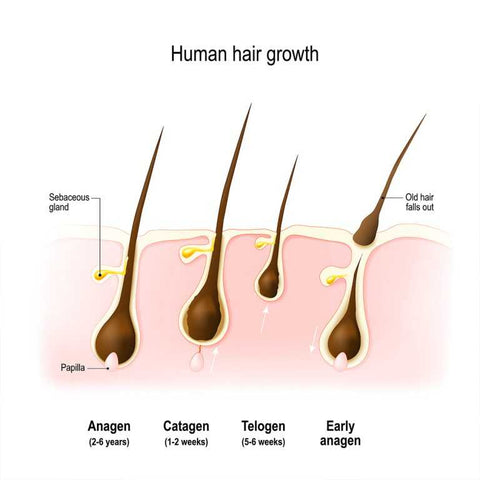
So, most of the time, the hair you shed will be just an end to a chapter in your hair-growth story. If everything is normal, your hair will grow back at the same intensity and speed as the fallen one.
Now, what about hair loss?
Hair loss happens when the replacing hairs are either fewer or less thick than the fallen ones. It may go under the radar for a few hair cycles, but the person will eventually notice the difference when the bald patches across the scalp get bigger.
Is Hair Shedding Normal?
In a nutshell, yes.
Hair shedding is normal, and sometimes, it doesn’t require professional help. Hair loss, however, requires an early diagnosis from a specialist who can stabilize the balding patterns and stimulate hair growth through medical or surgical intervention.
Wondering if hair shedding during shower is normal? Yes. It is.
Learn more here: Hair loss in shower.
Why Is My Hair Shedding So Much: 10 Major Reasons
Hair shedding has so many reasons. Luckily, they are all curable, and you can reduce excessive hair shedding and even stop it if diagnosed early. Here are some of the causes of hair loss based on how commonly they occur:
Hair Shedding Reason #1: Stress (Telogen Effluvium)
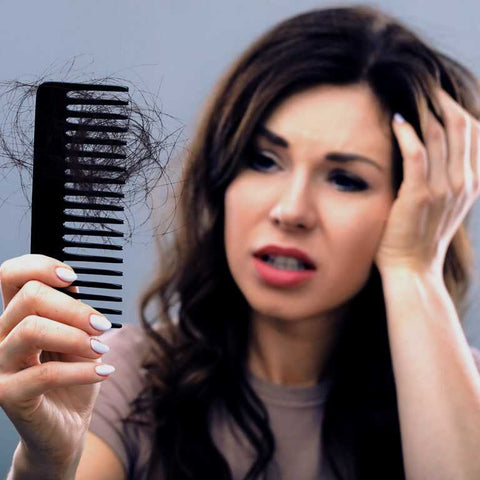
Stress can indeed be a cause for extreme hair shedding. When we experience high levels of stress, it can disrupt the natural hair growth cycle, leading to increased hair shedding. Problems at work or a bad breakup might be the reasons your hair is shedding so much.
Stress, according to the American Journal of Dermatology, is the primary reason behind unexplained hair loss in women. Not just that.., severe stress can also hurt your skin and cause acne, psoriasis, and eczema.
Hair Shedding Reason #2: Hair Falling out During or After Pregnancy
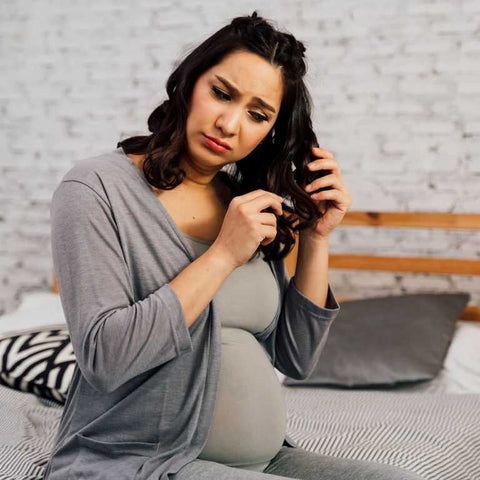
Postpartum hair shedding is a common situation among women, especially those who are giving birth for the first time. Studies show that accidents, surgeries, and pregnancy usually take their toll on a woman’s hair and cause it to shed in a matter of two or three months after the actual incident.
During this period, the body takes a rest from hair growth (the Telogen phase) and focuses its resources on healing the injured/stressed organs.
Sounds a little bit horrifying, but the good news is that another hair-growth cycle will begin six to nine months later.
Find out how pregnancy and hair loss are related.
Hair Shedding Reason #3: Zinc Deficiency
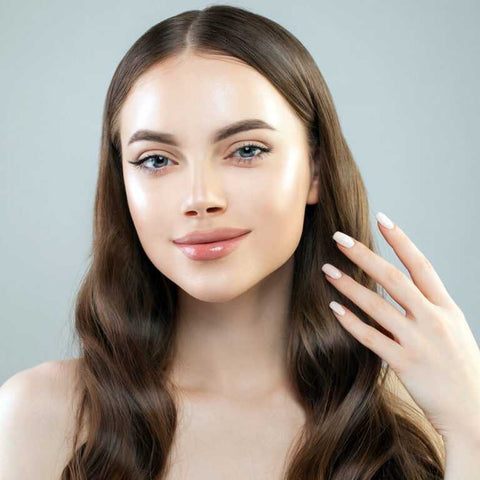
Zinc is a strong antioxidant that keeps your hair follicles healthy and stimulates the sebaceous glands to secrete hair oils called sebum that lubricate the scalp and make your hair look shiny and alive.
Even though zinc deficiency isn’t the main cause behind hair shedding, some studies have found a strong link between the severity of alopecia and zinc deficiency.
Studies also found that most of the diets circled around one or two types of food can cause excessive shedding of hair. This is because your body doesn’t generate zinc on its own and can only get it from high-protein foods such as chicken, red meat, and fish. So, a single-item diet may not be the go-to option when suffering from hair problems.
Hair Shedding Reason #4: Iron Deficiency
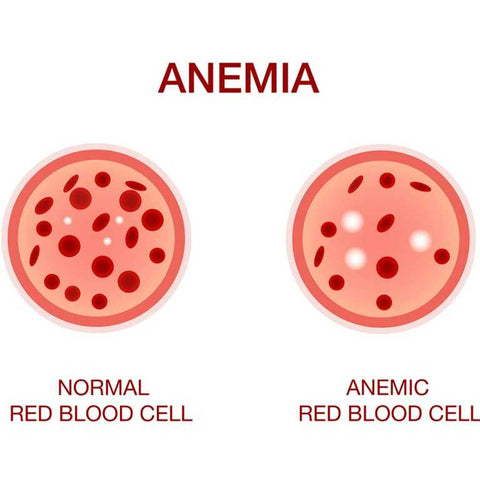
To understand the link between hair shedding and iron deficiency, we must first understand why oxygen is so important to your hair.
In one study, a research team from the Massachusetts General Hospital increased the hair volume of male mice by 70 percent by expanding the blood vessels in their scalps. The team also found that such expansion depended mostly on the amount of oxygen reaching those blood vessels.
I.e., more oxygen = bigger vessels = thicker hair follicles
Now, guess which nutrient is responsible for regulating the oxygen supply that reaches the scalp cells? Yes, it’s iron, and its deficiency, according to some studies, can cause both hair shedding and female pattern baldness.
Hair Shedding Reason #5: Menopause & Hormonal Imbalances
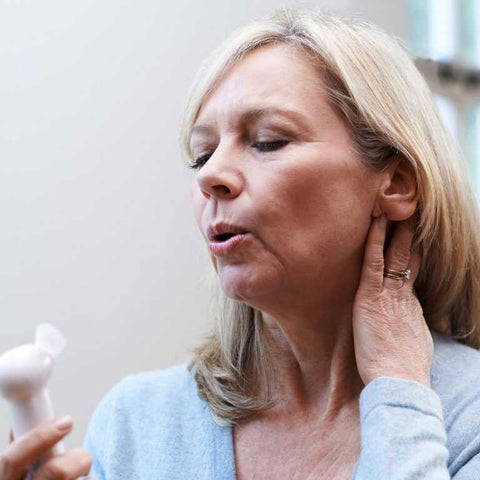
Estrogen is one of the few hormones that activate hair growth. During pregnancy, the ovaries produce more than enough estrogen to speed up the hair growth cycle.
This rule, however, is inverted after menopause and hence seems to be the reason for hair shedding. The rates of both estrogen and progesterone (female sex hormones) decrease while the rates of androgens (male sex hormones) spike subsequently and cause two problems:
- Hair thinning: This happens when the androgens reduce the follicle diameter and empty the scalp of its hair.
- Slow hair growth: By not having enough estrogen/progesterone, the hair growth cycle will slow down, and the process of replacing the fallen hairs becomes much harder.
Get to know The relationship between menopause and hair loss.
Hair Shedding Reason #6: Thyroid Problems

Thyroid problems, such as an underactive thyroid (hypothyroidism) or an overactive thyroid (hyperthyroidism), can cause hair shedding. The thyroid gland's primary function is to regulate the energy you get from food by secreting two primary hormones into your blood: Triiodothyronine (T3) and Tetraiodothyronine (T4). Any sparse or excessive production of these hormones can cause a number of hair problems that range from hair thinning to excessive hair loss depending on the severity of the case.
Learn more on Thyroid Induced Hair Loss.
Hair Shedding Reason #7: Inflammatory Bowel Disease
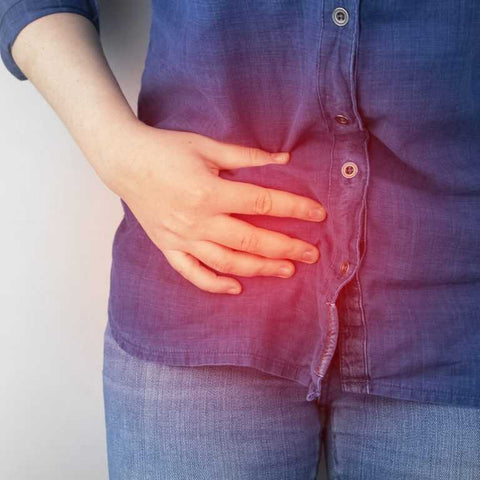
Inflammatory bowel disease (IBD) is a condition that occurs in either the colon or the gastrointestinal tract. Studies are yet to show whether it’s the disease or the treatment that causes hair shedding but what we are sure of is that hair shedding is usually a byproduct of IBD.
Hair Shedding Reason #8: Traumas, Accidents and Fevers
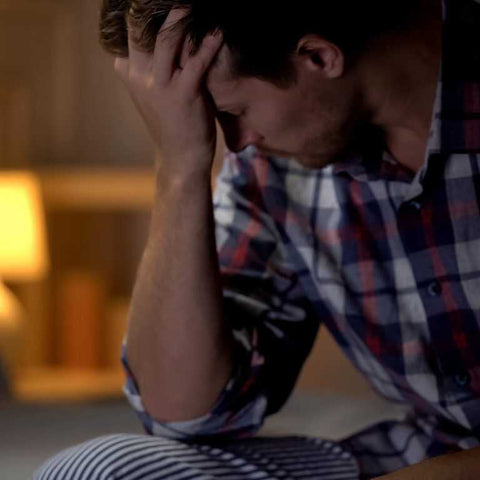
Unexpected losses, misuse of hair products, or severe fevers with illness are some of the most common reasons for hair falling out. The common theme in such situations is that the hair starts to fall three or four months after the MAIN incident which leaves a lot of room for wrong speculations.
This situation, also known as Hair Follicle Miniaturization, is usually accompanied by notable shrinkage in the follicles` diameter, which causes the hair to either grow weak or not grow at all.
Hair Shedding Reason #9: Traction Alopecia
That high Ariana Grande ponytail may look cool, but it could be placing terrible stress on your hair follicles. Avoid tight hairstyles that place traction on follicles. This can lead to a condition called traction alopecia. Hair care is more than just buying a good shampoo and conditioner. Tugging at your hair from the roots can really harm your hair follicles. Theradome user, model, and biomedical engineer Megan Pormer experienced this right after she appeared at the American Influencer Awards. Hear Megan's story here:
Hair Shedding Reason #10: Chemotherapy & Medications

There are two types of drug-induced hair loss:
Anagen Effluvium
A severe hair loss occurs during the hair growth phase (the Anagen phase), and it’s usually caused by chemotherapy.
Telogen effluvium
This Happens during the resting phase of hair growth (the Telogen phase), in which the scalp sheds between 25 to 75 extra hairs a day in addition to the 50-100 hairs.
This type of hair shedding usually takes place 15 to 30 days after taking specific drugs such as antibiotics, antidepressants, acne drugs, cholesterol and high blood pressure drugs, steroids, and birth control pills.:
9 Ways to Stop Hair Shedding and Grow Back the Lost Hair
Yes, you can reduce/stop hair shedding and grow back/reverse the hair loss. However, you must understand that hair shedding won't stop immediately, and you'll have to make some lifestyle changes in order to see some real progress. There are various factors that contribute to hair shedding and hair loss like genetics, nutritional deficiencies, hormonal changes, medication side effects, stress, certain medical conditions, and styling practices. To address and stop hair shedding and promote hair regrowth, it's essential to identify the root cause and adopt some lifestyle changes.
Although hair shedding is a natural process of hair growth, excessive hair shedding is a worrying condition that should be addressed early. Here are some ways you can prevent it with these hair shedding remedies:
1. Eat Healthy
Eating healthy can help reduce hair shedding. A balanced diet with plenty of nutrients nourishes the hair follicles, promoting stronger and healthier hair growth. Include foods rich in vitamins, such as fruits, vegetables, and whole grains. Remember, a healthy diet is a simple yet effective way to stop hair shedding naturally.
2. Eat Extra Protein
Proteins are the building blocks of hair and constitute about 95% of the hair structure. Your diet can significantly impact hair growth and its strength if you include protein-rich foods like eggs, lean meats, fish, dairy products, legumes, nuts, and seeds in your diet. Adding protein to your meals can support strong and resilient hair, reducing hair shedding.
3. Zinc
Zinc is a mineral that can help prevent hair shedding. Our bodies need zinc for hair growth and repair. You can lose more hairs than normal if you do not get enough zinc. In addition to its hair-growth benefits, zinc also improves your digestion, immune system, and the development of your central nervous system.
Some of the foods rich in zinc are shellfish, lentils, beans, red meat, hemp and pumpkin seeds, eggs, and nuts. An adequate intake of zinc through food sources or supplements may help stop excessive hair shedding.
4. Iron
Iron has so many benefits; it improves your energy and mood, prevents anemia, and makes your skin glow. It’s also crucial that pregnant women get sufficient amounts of iron (usually double the regular amounts) to increase the oxygen supply reaching their fetuses.
Examples of foods rich in iron are spinach (of course), liver, peas, lentils, quinoa, tofu, broccoli, and shellfish.
5. Take the Right Supplements
There are so many supplements in the market, but these are the ones your hair really needs.
Vitamin D
Vitamin D is a natural immunity booster that increases the absorption of calcium in the blood and thus strengthens your bones. It can also improve your memory and prevent cardiovascular damage. The best way to get vitamin D is through daily exposure to sunshine for around 15 minutes.
According to a 2019 study by the University of Dublin, almost one billion people suffer from vitamin D deficiency that may lead to depression, cancer, and inflammation.
Another study found that vitamin D replacement therapy helped a group of patients with nonscarring alopecia get their hair back in a matter of a few weeks or months, depending on the severity of their cases.
Also Read: Connection of Vitamin D and Hair Loss
Vitamin A
Vitamin A, similar to zinc, moisturizes your scalp through the process of sebum production. Studies show that vitamin A deficiency can contribute to both anemia and hair shedding and may also cause alopecia.
You can find vitamin A as a stand-alone supplement or in multivitamins. You can also find it in dairy, fish, liver, carrots, and broccoli.
Zinc
We already mentioned both zinc and iron and the foods rich in them. But you can always take zinc as a supplement to make sure you have enough of it.
Biotin (the hair vitamin)
Scientists call biotin the hair vitamin or Vitamin H (the H stands for hair and skin in the German language), so imagine how dangerous it will be for your hair to suffer from biotin deficiency. Biotin stimulates the production of Keratin which is the number one protein your hair needs for growth.
Find more on how biotin promote hair growth.
Your body usually gets sufficient amounts of biotin from common foods like meat, eggs, and nuts. However, in some cases, especially during pregnancy and breastfeeding, you will need to increase your biotin intake to prevent hair shedding. This should always be under the supervision of your doctor.
6. Exercise, meditate, and meet some friends
Exercise, meditation, and meeting up with friends can also stop your hair from shedding since they lower your stress. Feeling very stressed can make your hair fall out more. Exercise helps your body make feel-good hormones that calm you down. Meditation clears your mind and relaxes your muscles. Spending time with people you care about can make you smile and forget your worries.
Your mental well-being is as important to your hair as the food you eat or the new shampoo you just bought. You must invest in your mental strength, even if it means sparring an extra 15 minutes each morning for yoga. According to recent studies, even a five-minute session of daily meditation can permanently rewire your brain to increase happiness, boost your immunity and lower your cortisol/stress levels. So, why would someone deny their body that amazing gift of peacefulness…and good hair?
Find out how exercise can improve your overall hair growth.
7. Use OTC hair loss medication
OTC hair loss medications can be a convenient and accessible option to reduce hair shedding and promote hair growth. There are several OTC medications available, but their effectiveness varies from person to person. Minoxidil is the only FDA-approved hair loss medication for both men and women. The effectiveness and results may take several months to become noticeable. It can also be messy to apply and may become expensive over time. Additionally, some hair loss treatments, like finasteride, are not recommended for pregnant women or women who want to become pregnant due to potential risks.
8. Take good care of hair and scalp
Maintaining good hair and scalp health involves a combination of a healthy lifestyle, proper hygiene, a balanced diet, and the use of appropriate hair care products. By adopting a healthy lifestyle and implementing proper hair care practices, you can have healthy hair, promoting the growth and vitality of your hair.
9. Use Theradome Helmet Consistently to Reduce Hair Shedding and Grow Hair Back
Theradome laser hair helmet helps in preventing hair loss, strengthens the hair shaft, and promotes new hair growth. For men and women wanting to reduce hair shedding, it helps to strengthen existing hair. For people who want to stop their current hair shedding immediately, it can produce results as soon as 4-6 weeks from the start of treatment.
First, it will minimize hair shedding by slowing it down. Second, it will reverse miniaturization by thickening existing hair. Lastly, it renews and promotes new hair growth. The timing of results may be different as individual results may vary. Achieving effective results requires time and patience but is very rewarding! The best part about Theradome is that there are zero side effects.
5 Signs of Hair Shedding You Need to Look Out For
Recognizing the signs of hair shedding, you can take timely action to prevent further hair loss. Here are some key signs to watch out for:
- Increased Hair on Your Pillow and in the Shower
If you notice an unusually high amount of hair on your pillow when you wake up or find clumps of hair in the shower drain, it may indicate excessive shedding.
- Thinning Hair
Pay attention to your hair's overall density. If your hair is becoming noticeably thinner, especially around the crown or the front hairline, it is a clear sign of shedding.
- Widening Part Line
A widening part line is a common sign of hair shedding, particularly among women. If your scalp becomes more visible along the part line, it may indicate excessive hair loss.
- Increased Hair Fall During Styling
While it is normal to experience hair fall when combing or brushing, if you notice a significant increase in hair fall during styling, it could be a sign that your hair is shedding more than usual.
- Receding Hairline
Men often experience a receding hairline due to male pattern baldness. However, if you notice a sudden and significant recession of your hairline, it may be a sign of excessive hair shedding.
Also Read: Does Shiny Bald Head Mean Permanent Hair Loss?
So Who is a Good Candidate for Theradome?
A good candidate for Laser Phototherapy is someone who is suffering from hair loss, a receding hairline, or looking to strengthen their current hair. The Theradome is designed to prevent and effectively treat the earlier stages of hair loss, I-1 to II-2 for women and IIA to V for men. Additionally, it’s ideal for anyone leading a busy life who doesn't have time to visit a clinic twice, or a week or would like to save money on clinical strength hair loss treatments. Take the hair quiz to find out whether you’re a suitable candidate.
Conclusion
Hair shedding is normal, but too much shedding can be a problem. Many factors like stress, pregnancy, nutrient deficiencies, hormone changes, illnesses, and certain medications can cause excessive hair shedding. To stop the extra hair shedding and regrow lost hair, it's important to address the root cause. Some good solutions are eating a healthy diet with enough protein, iron, zinc, and vitamins, reducing stress through exercise and meditation, using proper hair care, and considering medication or laser treatments like the Theradome helmet. With the right approach, you can get excessive shedding under control and promote thicker, fuller hair growth.


































